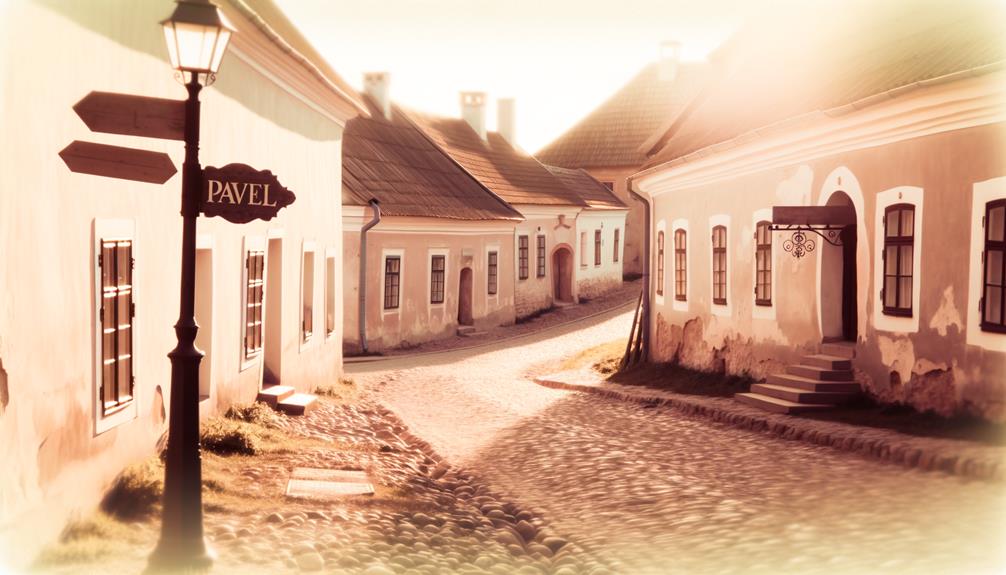Meaning of the Name Pavel
The name Pavel originates from the Latin term 'Paulus', meaning 'small' or 'humble'. It gained prominence through early Christianity, particularly associated with St.
Paul the Apostle, who was pivotal in spreading Christian teachings. Historically, the name signifies humility and resilience, reflecting the virtues upheld by St.
Paul. It has been widely adopted in Slavic-speaking regions and symbolizes cultural interaction influenced by Roman traditions.
Bearing the name Pavel suggests a legacy of modesty intertwined with significant historical and religious contexts. For a deeper understanding of its impact and notable bearers, further exploration is encouraged.

Key Takeaways
- Pavel originates from the Latin name Paulus, meaning 'small' or 'humble'.
- The name is associated with St. Paul the Apostle, an early Christian figure.
- Pavel signifies humility, resilience, and strength in various cultures.
- The name has historical significance in religious, cultural, and political contexts.
- Pavel is widely used in Slavic countries, reflecting cultural adaptability and enduring popularity.
Origins of the Name
The name Pavel originates from the Latin name Paulus, meaning 'small' or 'humble.' Historically, Paulus was a common Roman family name and gained prominence through St. Paul the Apostle, a pivotal figure in early Christianity.
St. Paul's missionary work and epistles played a crucial role in the spread of the name across Europe. Over centuries, the name evolved into various forms in different languages, reflecting cultural and phonetic adaptations.
In Slavic regions, particularly Russia and the Czech Republic, the name Pavel became prevalent. The adoption of Pavel in these areas was facilitated by the spread of Christianity, where many names of biblical origin were integrated into local naming conventions.
Thus, Pavel embodies a rich tapestry of religious, historical, and cultural significance.
Linguistic Roots
Tracing the linguistic origins of the name Pavel reveals its etymological journey from the Latin term 'Paulus,' which means 'small' or 'humble.'
The name Paulus changed over centuries, going through different linguistic changes. In the early Christian period, the name was adopted into Greek as 'Paulos,' keeping its original meaning.
As Christianity expanded, the name was further absorbed into Slavic languages, turning into 'Pavel' in Russian, Czech, and other Slavic dialects. Each version maintained the core idea of modesty and humility.
The name's shift from Latin to Slavic languages demonstrates the flexible nature of linguistic adaptation, showing both cultural interactions and the lasting impact of ancient Roman naming practices on modern naming trends.
Historical Context
In the annals of history, the name Pavel gained prominence through its association with early Christian saints and martyrs, contributing to its widespread adoption across Europe.
Deriving from the Latin name Paulus, which means 'small' or 'humble,' Pavel became emblematic of virtues esteemed in Christian doctrine. The spread of Christianity through the Roman Empire facilitated the name's integration into various languages and cultures.
By the Middle Ages, Pavel had solidified its presence in Slavic regions, especially in Russia and the Balkans. Historical records show that the name was borne by notable figures who influenced religious, cultural, and political landscapes.
This historical context underscores Pavel's enduring legacy and its transformation from a humble Latin origin to a revered name across continents.
Religious Significance
Rooted in its historical prominence, the name Pavel carries profound religious significance, particularly within Christian traditions. Deriving from the Latin 'Paulus,' meaning 'small' or 'humble,' the name is associated with St. Paul the Apostle, a pivotal figure in early Christianity. St. Paul, originally Saul of Tarsus, underwent a transformative conversion, becoming a zealous proponent of the faith.
Biblical Conversion: Saul's dramatic transformation on the road to Damascus is a cornerstone narrative in Christian doctrine.
Epistolary Contributions: St. Paul's letters form a significant portion of the New Covenant, offering theological insights.
Missionary Journeys: His extensive travels established early Christian communities across the Roman Empire.
Thus, the name Pavel encapsulates both humility and spiritual fervor.
Famous Bearers
Throughout history, the name Pavel has been borne by numerous influential figures, ranging from political leaders and scientists to artists and writers.
In literature, Pavel is often depicted as a character embodying resilience and intellect, reflecting the name's enduring appeal.
Contemporary notable individuals named Pavel continue to shape diverse fields, underscoring the name's persistent relevance across centuries.
Historical Figures Named Pavel
Notable historical figures named Pavel have left indelible marks across various fields, from political leadership to scientific advancements. Originating from the Latin name Paulus, meaning 'small' or 'humble,' the name Pavel has been borne by many influential individuals.
- Pavel I of Russia: This 18th-century tsar is remembered for his complex reign and efforts to reform the military and administrative structures of the Russian Empire.
- Pavel Tretyakov: A significant patron of the arts, Tretyakov founded the Tretyakov Gallery in Moscow, which remains a cornerstone of Russian cultural heritage.
- Pavel Cherenkov: Awarded the Nobel Prize in Physics in 1958, Cherenkov's discovery of Cherenkov radiation has had lasting impacts on the field of particle physics.
These individuals illustrate the profound influence of bearers of the name Pavel.
Pavel in Literature
The name Pavel has also graced the literary world, with notable authors and characters contributing to its rich cultural tapestry. Originating from the Latin "Paulus," meaning "small" or "humble," Pavel has found prominence in Slavic literature and beyond. Esteemed writers such as Pavel Florensky, a Russian Orthodox theologian and philosopher, have left indelible marks on intellectual history. Additionally, the character Pavel Smerdyakov in Fyodor Dostoevsky's "The Brothers Karamazov" adds a layer of psychological depth to the narrative.
| Author/Character | Work |
|---|---|
| Pavel Florensky | The Pillar and Ground of Truth |
| Pavel Smerdyakov | The Brothers Karamazov |
| Pavel Korchagin | How the Steel Was Tempered |
| Pavel Bazhov | The Malachite Casket |
| Pavel Petrovich Kirsanov | Fathers and Sons |
These examples illustrate Pavel's enduring influence in literary contexts.
Contemporary Notable Pavels
In contemporary times, the name Pavel continues to be borne by individuals who have achieved significant recognition across various fields, reflecting its enduring cultural and historical resonance. The name, rooted in Latin origins and meaning 'small' or 'humble,' finds its bearers excelling in diverse domains:
- Pavel Durov: The Russian entrepreneur and founder of the social networking site VK and the messaging app Telegram, symbolizing technological innovation.
- Pavel Nedvěd: The Czech football legend, whose illustrious career and accolades, including the Ballon d'Or, underscore athletic excellence.
- Pavel Haas: A renowned Czech composer whose works, despite his tragic fate during the Holocaust, continue to inspire and resonate within the classical music canon.
These notable Pavels highlight the name's multifaceted legacy.
Cultural Impact
The name Pavel holds significant cultural weight, particularly within Russian history where it has been borne by notable figures, including Tsar Paul I of Russia.
Its prevalence in literature, as seen in works by authors like Fyodor Dostoevsky, further underscores its impact.
Additionally, contemporary figures named Pavel continue to shape its perception, contributing to its enduring popularity.
Russian History and Usage
Pavel, a name deeply rooted in Russian history, traces its origins to the Latin name Paulus, signifying 'small' or 'humble.' The name's usage became widespread in Russia due to:
- Orthodox Christianity: The name gained prominence as it was associated with Saint Paul, a key figure in Christian theology.
- Imperial Influence: Pavel I, the Russian emperor, further solidified its status by ruling from 1796 to 1801.
- Cultural Integration: The name Pavel appears frequently in Russian historical documents and records, reflecting its deep integration into Russian society.
These elements underscore the name's etymological journey from Latin to Russian, illustrating its historical and cultural significance. Understanding these factors provides insight into the enduring legacy and appeal of the name Pavel in Russian heritage.
Popularity in Literature
Literary works across Russian history frequently feature the name Pavel, reflecting its cultural resonance and widespread acceptance. This name, derived from the Latin 'Paulus,' meaning 'small' or 'humble,' has found its place in the narratives of renowned authors, underscoring its enduring appeal.
Dostoevsky's 'The Brothers Karamazov' introduces Pavel Smerdyakov, a character whose complexities deepen the novel's thematic exploration. Additionally, Pavel serves as an emblem of the everyman in Russian folklore and Soviet literature, encapsulating societal struggles and triumphs.
Its linguistic roots and historical context enrich its literary presence, making it a versatile character name that transcends eras. Consequently, Pavel remains a favored choice for authors, symbolizing both personal humility and universal human experiences.
Famous People Named Pavel
Beyond its prominent role in literature, the name Pavel has also been borne by numerous influential figures throughout history, further solidifying its cultural significance. Originating from the Latin name Paulus, meaning 'small' or 'humble,' Pavel has found resonance across various fields.
This name's impact is illustrated by:
- Pavel Bure, a legendary Russian ice hockey player, known as 'The Russian Rocket,' who left an indelible mark on the sport.
- Pavel Haas, a Czech composer whose works remain a tribute to resilience and creativity during the tumultuous times of World War II.
- Pavel Florensky, a Russian Orthodox theologian, philosopher, and scientist, whose interdisciplinary contributions continue to inspire diverse academic fields.
These individuals highlight the name's enduring legacy and broad cultural influence.
Modern Usage
In contemporary times, the name Pavel frequently appears across various cultures, reflecting its enduring appeal and versatility. Originating from the Latin name Paulus, meaning 'small' or 'humble,' Pavel has transcended its Roman roots to become widely adopted in Slavic-speaking countries.
This name found particular resonance in Russia, the Czech Republic, and Bulgaria, among others. Its linguistic journey showcases the fluidity of cultural exchange, as the name seamlessly integrates into different linguistic traditions while preserving its core meaning.
Modern usage of Pavel spans multiple spheres, including academia, sports, and the arts, underscoring its universal adaptability. Its continued popularity is indicative of both historical continuity and a robust cultural presence that bridges past and present.
Name Characteristics
The name characteristics of Pavel are deeply rooted in its etymological origins and historical context, reflecting a blend of humility and resilience that has allowed it to thrive across various cultures. Derived from the Latin 'Paulus,' meaning 'small' or 'humble,' Pavel carries an essence of modesty.
Its historical use spans across Eastern Europe, signifying strength and endurance in times of adversity.
Key characteristics include:
- Humility: Stemming from its Latin roots, signifying modest beginnings.
- Resilience: Historical use denotes strength despite challenges.
- Cultural Adaptability: Widespread presence in Slavic countries, illustrating its linguistic versatility.
Thus, the name Pavel stands as a tribute to both personal virtue and cultural endurance, resonating deeply within its historical and linguistic framework.
Conclusion
The name Pavel, with its roots planted firmly in the fertile soil of ancient languages, history, and religious traditions, serves as a timeless bridge connecting past and present.
Symbolizing resilience and continuity, Pavel remains a reflection of cultural legacies and linguistic evolution. Its enduring presence among notable figures and within modern contexts reflects the name's intrinsic value and adaptability, much like a venerable tree weathering the seasons while nourishing the soil of human heritage.






